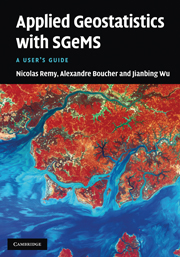Book contents
- Frontmatter
- Contents
- Foreword by Albert Tarantola
- Preface
- List of programs
- List of symbols
- 1 Introduction
- 2 General overview
- 3 Geostatistics: a recall of concepts
- 4 Data sets and SGeMS EDA tools
- 5 Variogram computation and modeling
- 6 Common parameter input interfaces
- 7 Estimation algorithms
- 8 Stochastic simulation algorithms
- 9 Utilities
- 10 Scripting, commands and plug-ins
- Bibliography
- Index
7 - Estimation algorithms
Published online by Cambridge University Press: 05 November 2011
- Frontmatter
- Contents
- Foreword by Albert Tarantola
- Preface
- List of programs
- List of symbols
- 1 Introduction
- 2 General overview
- 3 Geostatistics: a recall of concepts
- 4 Data sets and SGeMS EDA tools
- 5 Variogram computation and modeling
- 6 Common parameter input interfaces
- 7 Estimation algorithms
- 8 Stochastic simulation algorithms
- 9 Utilities
- 10 Scripting, commands and plug-ins
- Bibliography
- Index
Summary
This chapter presents the SGeMS collection of estimation algorithms related to the kriging estimation formalism. First the algorithm KRIGING is presented. It performs estimation of a single variable either by simple kriging, ordinary kriging, kriging with a local varying mean (LVM) or kriging with a trend. KRIGING also allows the possibility to estimate block values from point data. Next, the COKRIGING algorithm is presented. The information carried by a secondary variable can be integrated with a Markov Model 1 or 2 (MM1 or MM2) or with a linear model of coregionalization (LMC). The third estimation algorithm is the non-parametric INDICATOR KRIGING (IK), which consists of simple kriging applied to binary indicator data. The last estimation algorithm is BKRIG, kriging with linear average variable, which allows to estimate property with point and/or block support data.
All these estimation algorithms require a search neighborhood within which to select the relevant neighboring data. The estimation procedure is only carried forward if a minimum number of conditioning data is found. Otherwise, the central node is left not informed and a warning message is issued. In such case the user could increase the search neighborhood to allow more data to be considered.
KRIGING: univariate kriging
Kriging is a generalized regression method that provides the best estimate in the least square sense, see Section 3.6. SGeMS can build and solve four types of kriging systems depending on the stationarity assumption about the mean of the random function model.
- Type
- Chapter
- Information
- Applied Geostatistics with SGeMSA User's Guide, pp. 109 - 131Publisher: Cambridge University PressPrint publication year: 2009



